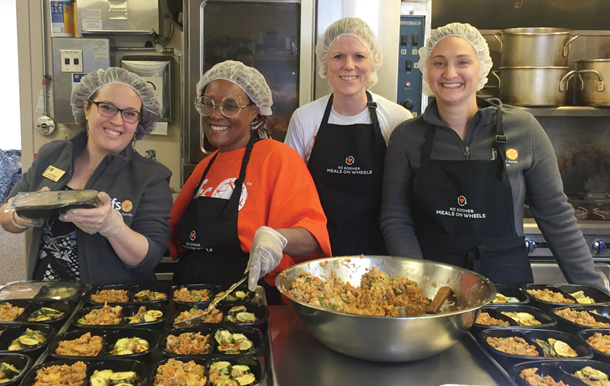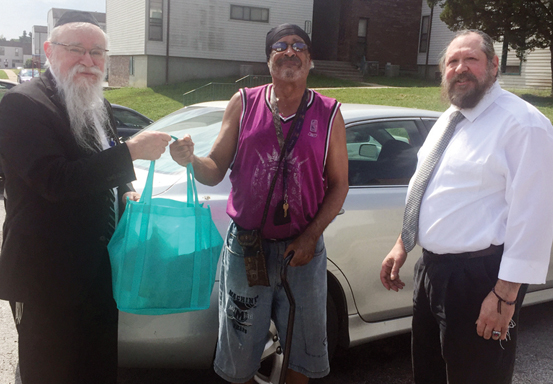
Serving over 11,000 meals a year, Kansas City Kosher Meals on Wheels (KCKMOW) celebrated its 5th anniversary this year. It began in April 2013 with just seven recipients.
Last year KCKMOW served about 65 people; this year it was over 70 and it’s continuing to expand.
Esther Friedman, who oversees the Torah Learning Center program, said the plan is to build up to serving 13,000 meals in 2019. Although the Jewish population in the greater Kansas City area is small, 18,000 to 20,000, she sees a definite need.
KCKMOW began serving seniors who were no longer able to cook or were in financial need and those with special needs. It’s been mostly due to awareness that the program has grown.
“As more people get to know about [our program] they come to us more,” Friedman said.
Recipients also are referred to Torah Learning Center (TLC) by Jewish Family Services, synagogues and word of mouth.
“A lot of the people we service are under the radar in terms of financial need, especially seniors who don’t attend synagogue anymore and may not be affiliated, and they’re homebound, sort of the silent ones,” Friedman explained. “So we decided to focus on that first, to find them. It’s hard when you’re poor and homebound.
“Some don’t have any family, some have family that are not living here and you’ve got some whose families are here but they’ve got their own lives and they can’t always be there.” Friedman said TLC began giving out food to the homebound or the sick for Shabbat when they moved here in the 1980s — soup, challahs, kugel. She and Rabbi Benzion Friedman wanted to do more back then, but didn’t have a commercial kitchen.
“To this day, we bring soup to seniors who are homebound even though they have somebody that takes care of them and cooks for them,” Friedman said. “It means a lot to them that somebody else is thinking about them.”
She said she would love to expand this part of the program because seniors just need the visitation.
“It would be wonderful to get kids to volunteer for something like that,” she said. “If anyone knows of someone who would like a visitation, please let us know.”
When the Friedmans built the current Chabad TLC on 103rd Street in 2008, they put in a full commercial kitchen. It was in 2012 that they began to think about serving kosher Meals on Wheels.
Not everyone who receives Kosher Meals on Wheels is kosher, but they are all Jewish. Some have just been through surgery and are unable to cook so they get the meals temporarily; but most have physical situations such as tremors or a stroke that renders them permanently unable to cook for themselves.
“They can stay in their homes, but don’t have the use of their hands, and the longer they can stay in their homes the more of a comfort it is to them,” Friedman said.
Five frozen home-cooked meals are delivered once a week on Sundays. They are packaged just like regular Meals on Wheels so people are only required to unseal them and a zap them in the microwave for three or four minutes. Friedman said very little canned food is used — these are homemade meals using fresh ingredients and they try to keep it low salt.
KCKMOW also delivers soup and fruit, plus bagels donated by Meshuggah Bagels of Overland Park and Bagel Works Café Inc. in Kansas City, Kansas. Friedman said that way the recipients have enough bread for the week and can have lunches out of it.
On cooking day, Friedman said it takes about fi ve volunteers to prepare the meals. But KCKMOW has about 100 who volunteer as cooks on a rotating basis. Some people cook once a year, some on a regular basis.
“We can touch let’s say 70 lives a year, seniors and people with special needs, but it also touches so many of the volunteers,” she said. “For the adults who cook together, there’s a friendship that results and a lot of support for each other.”
There are also children that volunteer — they go with their parents to deliver the meals. One child helps package the meals on Sunday mornings and there are 20 to 30 children from Hyman Brand Hebrew Academy who raise money and go to the store to buy products.
“That’s a lifelong impact,” Friedman said.
Counting children and adults, there are about 100 volunteers who help deliver.
“People are really empathetic, people really want to be there and help,” Friedman said. “I’m actually amazed to see how often a volunteer extends themselves beyond just the delivery. They help clean up the house, they will go to the supermarket for them; they’ll see a need and bring it to our attention.”
KCKMOW will also be expanding when TLC creates a commercial dairy/ Passover kitchen. Friedman said they cook more than 300 meals for Passover and it’s hard when there’s no space specifi cally for that. They have to kasher all the pots, pans, utensils, etc. In addition, they need another walk-in freezer.
“We have three freezers now and it’s not enough to store the meats and boxes and breads,” she said. “So we are defi - nitely looking to expand now. People age and people need it.”
While it helps tremendously that the Jewish Federation, the Jewish Community Foundation and Menorah Heritage all support KCKMOW, Friedman said they rely on a lot of private donations. Monetary donations can be sent to Torah Learning Center, 8800 W. 103rd Street, Overland Park, KS 66212. Specify that it is for KCKMOW. They ask that people not drop off canned or boxed food because fresh foods are primarily used for KCKMOW and there are people who shop for those.
Friedman said KCKMOW covers the entire greater Kansas City area, including Kansas City, Kansas, and the Northland.
If you know of someone in need of KCKMOW, call Rabbi Levi Friedman at 913-710-3236. Or you can call Torah Learning Center at 913-385-5770.
“Thank G-d, we’re very proud of what we’ve accomplished with the help of all the people who have financially supported and continue to support the program and with all the people who have volunteered,” Friedman said. “We couldn’t do this on our own. Everybody who has helped us is really remarkable and what I find heartwarming is the compassion and the empathy.
“The Kansas City Jewish community is wonderful. They’re warm, they care. We have volunteers from across the whole community affi liated with every synagogue or non-affi liated. It’s nice when you have that kindness and generosity in the community."



